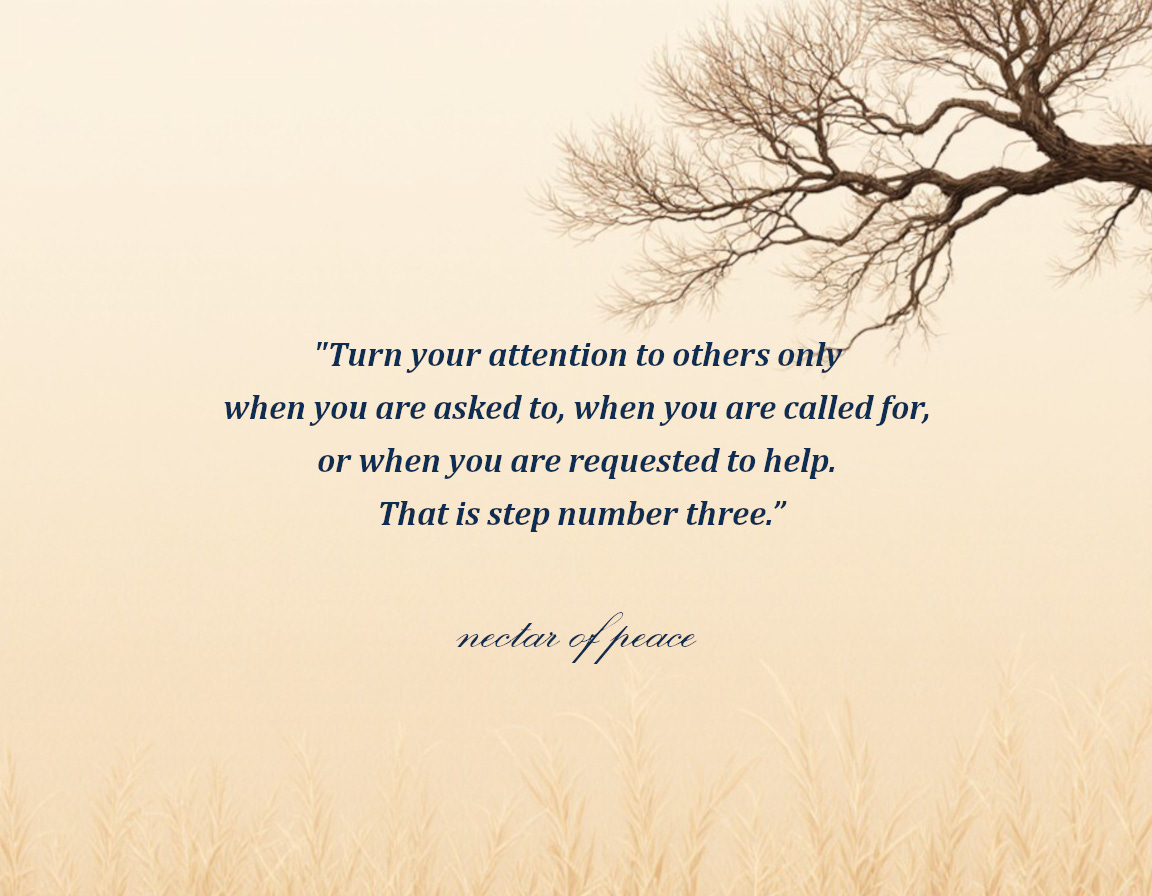🎧 Please listen to the audio using the player above.☝️
In this very first episode of Nectar of Peace, I’ll introduce the podcast and share its purpose. I’ll also share one essential teaching - simple yet powerful that, when followed, naturally leads to greater inner peace and lasting contentment.
What you’ll hear in this episode:
A warm welcome and introduction to the Nectar of Peace podcast
3 key steps that can guide you toward peace and contentment
My name is Mitja Žibert, and I’ll be your host on this podcast, which serves as an invitation to personal and spiritual growth.
Sources:
· Novo: Lectures and Q&A archive
If this opening episode resonated with you, consider sharing it with friends or loved ones - you might just help someone on their path.
Episode transcription
Welcome to this first episode of the podcast called Nectar of Peace, which is dedicated to sharing universal truths and wisdom taught by humanity’s greatest teachers and sages.
My name is Mitja Žibert, and I’ll be hosting this program as an important part of my vocation which is to share these teachings that I myself try to live by as well.
This podcast also serves as an invitation to all modern people, regardless of their age or life conditions, who feel there is something missing in their daily lives: a sense of prolonged peace, balance, contentment, and purpose.
Most of us reach a point in life when we realize the need to make a certain shift, but somehow we keep getting pulled back into old habitual patterns and the destructive sociocultural conditioning. And the more we repress this realization and paper over the cracks, the more we are drawn into discontent, anger, and confusion.
This call for a shift is sincere and originates from our deepest innate intelligence, yet our willingness to follow it easily falters. To succeed, we must approach it with care, faith, persistence, and, above all, the right guidance. Where better to look than to the greatest teachers and sages of humanity, who have, since time immemorial, each in their own way, shared universal truths about all aspects and dimensions of life.
And so, I would like to, even in this first recording, share one seemingly simple, but yet profound knowledge, which beautifully opens this program. This knowledge was shared by a teacher, Novo, who supportively guides me, like many others, on our path and whom I consider to belong to the aforementioned group of teachers.
Since his teachings are largely accessible to modern humans in terms of content, reasoning, and feeling, yet remain inaccessible to the public at large, they will form the core of these episodes. Novo has also encouraged the idea of me sharing his teachings in this manner. I will, however, share the teachings of other great teachers as well. And, when I say “great teachers” or “sages,” I am referring to those who have truly reached final liberation, self-realization, or so-called enlightenment. Alongside Novo's teachings, we will therefore also explore the teachings of:
Gautama Buddha
Jesus Christ
Satya Sai Baba
Jiddu Krishnamurti
Osho
Ramana Maharshi
Lao Tzu
Peter Deunov
Ramakrishna Paramahansa,
Swami Vivekananda
Paramahansa Yogananda
Swami Satyananda
and so on …
Each of these teachers, along with their own teachers or spiritual traditions, has profoundly contributed to humanity's well-being. And, as we will see, there are many more such self-realized teachers to explore.
Two short notes, before we touch on the first teaching, which will serve as a beautiful introduction to all future recordings.
First, I want to emphasize my intention to share knowledge and truths in the original and unaltered form, as much as possible. This is of key importance if we want to retain the teachings and their essence. I will, however, when deemed necessary or useful, add notes or additional explanations to the given content. These, too, will be based on the teachings of the same teachers. The fact is that when exposed to this knowledge, we may sometimes feel a certain lack of clarity or even feel it to be incomplete or irrelevant to us. But later on, when we encounter that same knowledge on some other occasion, in a different way, or simply when we are more ready, the pieces gradually fall into place. And these pieces will form the basis for my commentaries.
Second, in these episodes, we will encounter certain words that are often misunderstood or completely misinterpreted, so I will try to gradually clarify their meanings. To give a few examples: happiness, which we often believe can be found in sensual pleasures; intelligence, which is mistakenly considered equal to intellect; and meditation, which is often considered to be an active concentration, yet, as we will learn, that is not what meditation truly is. I could also add words like love, karma, freedom, destiny, prayer, mantra, chakra, and so on. As we will see, there are many such terms, and our lives are often shaped by the meanings we assign to them.
Teachings
But, let me get back to Novo. For this first episode I chose something which we can all relate to and can be truly useful to everybody. I chose a question posed to Novo by a lady, where she asks him to give practical steps that lead to becoming like Novo, or to reaching the goal. But to not give something currently unreachable, but something basic and accessible.
To her request, Novo gave the following answer:
“First step: you must not deal with other people. You must not waste time thinking about other people or be interested in other people. That is the first step.
Second step: deal only with that which is for you to deal with, meaning deal only with your own matters. That is step number two.
And step number three: turn your attention to others only when you are asked to, when you are called for, or when you are requested to help. That is step number three.”
Here, I must add that Novo is clearly aware of the meaning of duty and responsibility. This means that when someone has a certain responsibility to others—for example, their children or their customers—this responsibility carries an inherent request for help, support, or cooperation.
And, like all other great teachers, Novo also strongly emphasizes the importance of doing good and serving others. As a useful addition to his answer I shared earlier, he said in some other conversations, that when we want to do good and help others, we can do that risk-free as long as we know in advance that the other wants it or will take it positively. But if we don’t know that, then it is important we first ask for permission to do so. This means we first ask the other, for example, “Can I help you with this?” If the other accepts, we help. But if they refuse, we must accept that, without bad feelings or thoughts, and we refrain from helping.
In his answer, he gave to the lady, he was referring to cases when such inherent responsibility or the necessary awareness doesn’t exist. In such cases, we should deal with others only when they ask us to. Or, put otherwise, when it is not about our own need, it is best to turn to others only when it is wanted or appreciated by them.
The basis for this kind of answer lies in the recognition that, as long as we have a limited consciousness, we cannot fully perceive the consequences of our self-initiated actions. Therefore, even though we may have the best intention to help, we may still do more damage than good and cause additional complications for both sides. For that, we carry the responsibility and the deeper consequences that come with it.
We will definitely learn more about this and why it operates like that in the future episodes, because understanding this clearly is of great importance for our life.
To this third step, about turning our attention to others only when asked, same lady also added a question: “But what if no one calls, seeks, or asks for anything from others? Like here, I don’t want anything from anyone, so no one should also seek nothing from me.”
To this, Novo replied: “If no one needs you or asks anything of you, you are free … which is great. This would mean that you don’t owe anything to anyone, and no one owes anything to you. But as long as anyone has anything unresolved in relation to you (good or bad), they will come. They will help you, do damage to you, ask from you, advise you … even the positive. What matters is that you don’t deal with others unless you are asked for … not by your initiative, but only by the initiative of others.”
Based on other discussions with Novo, I will add here that his reply doesn’t mean we shouldn’t seek help from others when we are in need. While it is beneficial and necessary to keep developing ever-higher levels of independence, as long as inability, dependency, or co-dependency exist, it is, of course, necessary to cooperate or ask for help. Regardless of this, it is good to remember, that only one that needs also seeks. One who doesn’t need, doesn’t seek. Therefore, if anyone asks anything from you, and if you can, and it doesn’t harm anyone, including yourself, give or help them to your best capability.
Novo concluded his answer by asking: “So, how does all this appear … difficult or not?” And, upon receiving confirmation that it seems easy, he added: “Yes, it really does seem easy, but when you try to put it into practice, it turns out to be extremely difficult.”
And it really is difficult—not only because our minds have strong inclinations and habits to deal with others through gossip, comparison, idolizing, competition, assimilation, expectations, judgment, and so on. There is also a general lack of self-knowledge and self-respect, a lack of perception into our deeper interconnectedness, and, of course, our limited understanding of life as a whole. Therefore, it is of utmost importance that we dedicate our time and will to deepen our realizations, and where better to look than to those who have already attained the final realization.
I invite you to put these three steps to the test in your daily living and see how much you’ve already internalized them, and where they still pose a challenge. Regardless of what you discover, let these steps serve you as an important guidance and inspiration on the path to self-knowledge … which, in itself, leads to a better and more beautiful life.
Conclusion
I like to believe that most of us share a deep understanding of how the teachings of these great teachers open a new perception of ourselves, others, and life itself. They can help us make positive changes, but they can also trigger a sense of aversion and doubt, which is completely normal, as they shake the deeply rooted foundations of our beliefs. This is necessary, useful, and one of the key reasons why we will return to these teachings in more depth in the episodes to come.
If you find this introduction intriguing or even inspiring, I warmly invite you to join and listen to the Nectar of Peace podcast - and, to be notified about the release of each episode, do sign up for notifications.
So, may in this beautiful spring, which awoke nature throughout Europe to bring new inspiration to people, this program also awaken and inspire us with the will to answer that call for change and with small, gradual steps, make the shift to a new way of living. This joint journey will take us through the discovery and exploration of profound knowledge, wisdom, practices, and occasional inspiring stories. From my own experience and from those with whom I have or still closely work, I can testify that this is a path that leads all who seek depth over distraction, intelligence over intellect, and peace over fleeting pleasures to a space where the mind settles, the heart opens, and life is filled with the nectar of peace.
I truly hope you will join me in the next episode and until then and in the spirit of the nectar of peace I send you my warmest greetings.
Originally posted on June 30th, 2025











